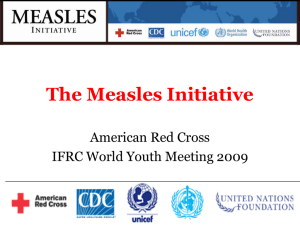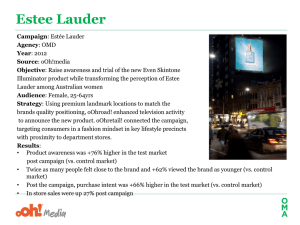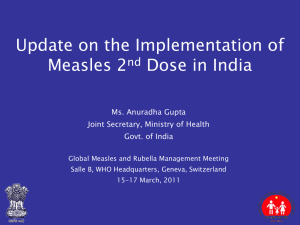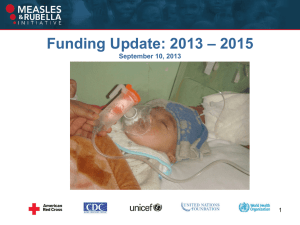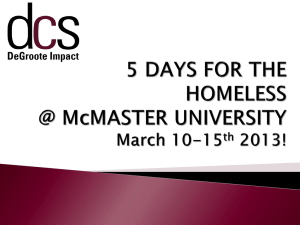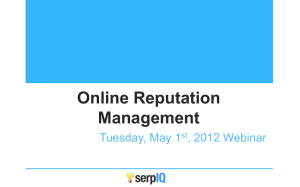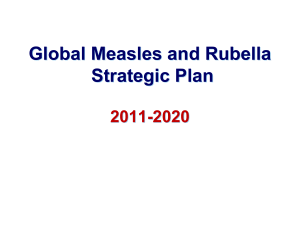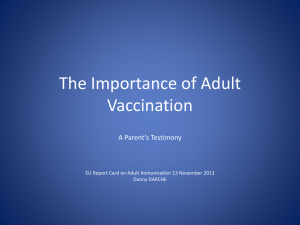PowerPoint Template - Measles & Rubella Initiative
advertisement
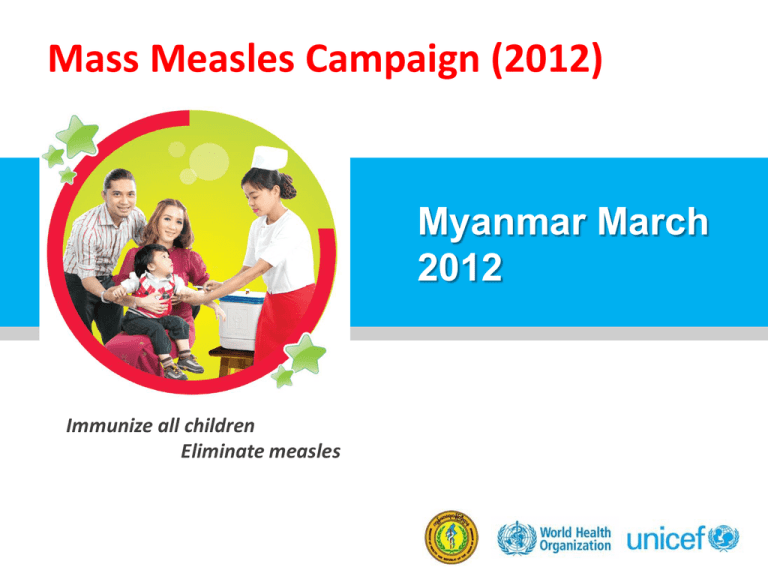
Mass Measles Campaign (2012) Myanmar March 2012 Immunize all children Eliminate measles Notes about this presentation Is a combination of slides Communications planning Monitoring results • National Monitoring observations (in-process independent monitoring-C. McNab) With thanks to Gov. of Myanmar, Dr. Vinod Bura, WHO Myanmar, and MMC partners. Outline What did Myanmar plan? What did Myanmar do? Observations from monitoring Results Overall Reach Grass Roots Level Movement to Reach Out 6.4 Million Children 9 to 59 mos for Mass Measles Campaign 22 -31 March 2012 What did they plan? Key Communication Objectives Inform about the dates of Mass Measles Campaign 2012 Apprise about where and how to avail immunization service Motivate parents and caregivers to get their children (9 months to 5 years old) immunized Key Communication Strategies Advocacy with national/state/region decision/policy makers Grass root movement – improved engagement of township leadership and village authorities Focus on continuous and targeted interpersonal communication (IPC) for raising awareness and demand creation Advocacy Advocacy for high level commitment During preparatory phase, high-level commitment obtained from Ministries, Central/State/Regional level authorities and other partner agencies to support MMC. A day-long workshop on enhancing awareness on Mass Measles Campaign for State and private print and broadcast media Documentation of campaign achievements and activities Media Field Visit for first hand reporting Media Advisory and Press Release The launching ceremonies Launching ceremony at Nay Pyi Taw is planned for inauguration by Health Minster with the presence of international and national media Launching ceremonies at the Central, State/Regional and Township levels with Chief Ministers; and other high authorities, children, celebrities and media A briefing kit will be used as an advocacy tool at the launches Social Mobilization Organize social mobilization activities – to generate more visible sub-national commitment Mobilize local authorities and related departments Mobilize INGO, local NGO, FBO, CSO, CBO and VHW to have access to hard-to-reach areas/border areas and to coordinate outreach efforts Mobilize faith leaders to discuss and agree on their role to address measles immunization in their respective communities Interpersonal Communication BHS and volunteers to take lead on: Informing families/caregivers about the dates of the measles campaign Mobilization activities in community Grass Roots Level Movement IPC training for BHS on communicating with families (combined with orientation for BHS) TMOs and BHS to lead and NGOs/CBOs to support distribution of posters, banners and supervise IPC activities for raising awareness and demand creation Announcement at schools – through school children to inform their families Railway/bus station announcement Send invitation cards to households with specific children’s names, date, time and vaccination place Miking announcement one day before launch in wards and villages, churches, mosques and monasteries Mass Media Channels 3-minute TV spot on MMC Celebrities endorsement with those who have 9 months to 5 years old children TV discussions/interviews Radio programmes and messages Communication package Logo Poster Post banner Billboard Advocacy kit Training manual Invitation card Caps for volunteers TV/radio spots and PSAs Development of a campaign brand with exclusive theme and colour scheme Campaign logo Poster Purpose: Inform families about the campaign and the dates Ask families to take all eligible children to the vaccination posts on campaign days Sites for posters should include: Hospital/rural health centre/sub-centre Markets Tea shops /Cinema halls Pharmacies Bus/train stations/ ferry Transit points Construction sites Advocacy folder A full information kit including Fact Sheet and Q&A. In English and Burmese language Purpose: Advocacy tool to be distributed at launching ceremonies/ advocacy meetings / media workshop Post banner Purpose: Inform families where the vaccination post is Ask families to bring children from aged 9 months to 5 years to the vaccination post Ensure all vaccination posts have posted “Post Banners”. Billboard Quantity: 20 (NPT, State/Region major cities); Size: 12’ x 8’ Purpose: Mass awareness Invitation card Front Back Quantity: 6.4 million Purpose: Invite families to bring their children (from 9 mths to 5 years) to a vaccination post (place) at ….. (time) and on ….. (date) Inform families about the measles, how to prevent and benefits of immunization Ensure invitations are sent to every single household in country by H-H- visits 3-4 days prior to vaccination day and mid wife, village head informs the family Other materials TMO Guideline Flip chart for training of Health staff and volunteers Field Guide for BHS Stickers Caps for all Health workers and volunteers Monitoring & Review Monitoring and review of impact of communication interventions will be part of overall monitoring process Joint communication and programme review recommended at township/state/regional and national levels INGO/ NGO meetings Central Executive Committee Meeting for Inter Department coordination Chaired by Health Minister Health Minister Chaired the inter departmental coordination meeting , inviting all State Chief ministers, all department heads from all ministries of government of Myanmar What did they do? Joint monitoring of MMC at a Glance 9 international monitors from WHO SEARO/ India, Bangladesh, Nepal, GAVI, UN foundation & Measles initiative visited Myanmar to monitor MMC 2012 51 National staff from WHO/ UNICEF also participated Joint monitoring of MMC at a Glance All 17 states and regions of Myanmar monitored 99 townships monitored 554 posted observed 5432 house checked by monitors 6002 children checked by monitors during H to H visits States, regions and townships Monitored for MMC 2012 UNICEF WHO Trainings Around 15,000 health workers and supervisors were trained before campaign on key technical issues, planning, injection safety , AEFI, Cold chain, Social mobilization 400 Medical officers TMO / SUDC / EPI managers from all provinces and townships were given comprehensive trainings on campaign planning and management by specifically designed tools. Training • Good use of cascaded training from national to regional and township levels Side 1 clear info for trainees • Excellent two-sided flipchart used nationwide resulting in standardized training at all levels Flipside 2 Clear instructions / info for trainers Micro-planning All teams had master list at all post Most of master list was updated. In few places master list was missing visiting family children or HRA children All areas need to be mapped not only accessible areas. Construction areas, plantation areas, mining areas etc were not clearly identified, highlighted in micro- plans Planning Continued Taungoo rural post lists daily personnel, TP, logistics Daily master lists of families and children corresponding to invitations makes tracking, follow-up easy Challenges: • Uneven use of these tools • Eg. One post had 3-day master list Microplanning Microplan for Bago HWs mark map in health post with booths, dates and TPs for MMC Post organization High turn out of community for vaccination Well organized , orderly flow of children and caretakers In some places festive atmosphere observed Local authorities, volunteers role and participation highly appreciated Transit post need to be increased and more proactive in future SIA Booth Operations & Injection Practices Good flow in every post observed from 1. screening/ registration… 2. Injection… 3. To resting for 30 minutes Cold chain and Injection safety Adequate no of logistics at all places Well maintained cold chain No pre filling of syringes Vaccine administration in correct 0.5 ml at right site Some health workers were observed giving Intra muscular injection No re- capping observed Safely box available and correct used universally HW had good knowledge of AEFI Booth operations/ injection practices Monitoring: midwives scored 100% on injection practices. Correct use of safety V. good vial mngmt Generally good 45° SC technique Storage; filling 1 per time Vaccine and logistics No shortage of vaccines /logistics observed Wet ice used at many locations AD syringes, mixing syringes Safety boxes and reporting formats in place Vaccine buffer stocks at Township or RHC was not adequate Booth Operations/ Injection Practices Some challenges with temperature despite good use of ice packs. VVMs showing no cold chain problems. Impressive meticulous association of vaccine vial with child. Bago rolled invitations around vial. Taungoo kept records in a notebook. AEFI Management All health workers were trained on AEFI Management Teams carried medication for anaphylaxis ( anti shock kits) Health workers were seen asking parents to wait to 30 min after vaccinating to handle any AEFI Close monitoring of AEFI cases and reporting. No major AEFI reported during campaign Supervision Pre campaign supervision needs to strengthened for corrective actions TMO should be encourage to conduct RCA during and after activity Supervision for migrant families, peri- urban settlements, and other high risk areas need improvement Social Mobilization Use of invitation cards found to be very effective and well appreciated by families Posters, Banner seen at most of place and effectively used Volunteers from Red cross, MMCWA, teachers, other department volunteers were actively engaged at vaccination post Nursing students participation is a positive step Media played a very important role, Media training was done well in advance ( print, electronic and Radio) New on measles campaign two weeks before SIA , daily coverage of achievements, appeal for left out parents Only positive new Social Mobilization V. good post visibility V. Good IEC materials Challenge: Not available at all posts Launch event = national publicity. TV and Radio also had impact (esp. TV in urban areas) Advocacy, Partnership & Social Mobilization Excellent partnership between midwives, the “yellow” and “blue” NGOs, INGOS and Village Leaders (in white in this photo) Excellent collaboration with National Pediatric Association Monitoring in Taungoo RCA: Source of Knowledge Blue = urban Brown = rural Widely observed: volunteer corresponds invitation card to master list In both rural & urban settings, RCA showed IPC (Village Head and Health Workers) with invitation cards most important social mob. Coverage among monitored children Around 5402 house visited Around 6000 children checked randomly 97% of these children were found vaccinated during MMC Many children received measles vaccine first time. Miking , invitation card and Health worker were the main source of information National: Source of information i. Miking: ii. Invitation Cards: iii. Volunteer's Visit: iv. Health Worker's Visit: v. Village Leaders: vi. Religious Places: vii. Relatives: viii. Neighbours: ix. TV: x. Radio: xi. Poster & Banner: xii. Newspaper: xiii. Other sources: 2161 4027 1351 2052 1093 64 124 369 453 298 1016 90 23 Media Medical association support Planning Trainings Conclusion Government of Myanmar demonstrates very high committed to the MDG4, GIVS and Measles elimination Myanmar health workers are highly committed and dedicated towards EPI program Community trust in EPI program is very high Myanmar measles campaign in March 2012 has helped to reduce immunity gap among children under 5 and prevent measles related morbidity/ mortality Immunity gaps still persist in high age group above 5 and some out break may continue in near future, MOH and partners should carefully review Measles program to plan additional interventions to close immunity gap in high age groups Thank you.



